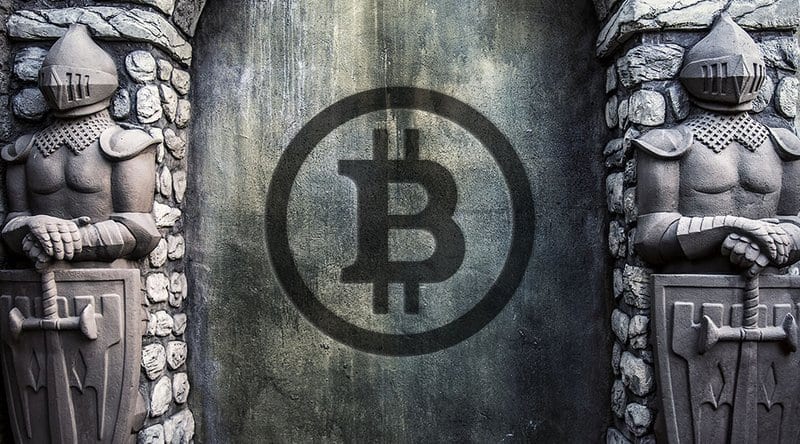[ad_1]

Bitcoin has the potential to challenge 18th-century monetary defensive protocols as a 21st-century modern monetary defense protocol (MMDP) alternative. For starters, the purpose of any defensive protocol is to provide natural barriers which are designed to increase safety and maximize security. So, the stronger the protocol, the superior protection and the security it provides.
The U.S. Constitution, for example, is a defensive protocol that was constructed to protect individual liberties while also outlining the limitations of “the people” defined for their government. This masterpiece of a defensive protocol is truly a revolutionary document that helped propel civilization forward in ways never experienced before in history. Furthermore, the U.S. eventually established the Department of Defense (not the Department of Offense) as an insurance policy to further defend our way of life. That being said, the right defensive protocol has the potential to shape the future and pave the way forward in ways we cannot fathom at this given moment in time.
Now, built into the country’s defensive protocol under Article 1 Section 10, one will find the nation’s monetary defensive protocol. This 18th-century monetary defensive protocol attempts to limit the government’s ability to spend by decreeing the nation’s debts will be paid using gold and silver. As we may have learned, history doesn’t repeat itself, but it often rhymes and the nation’s founders were very aware of the inherent dangers of overextending the country’s obligations through a debased money supply. After all, what is history but a societal pendulum swing that starts with quality money (gold and silver) to quantity currency (debased currency) and then back to quality money again. Up until very recently, gold and silver have been the best defensive monetary protocol against runaway inflation and currency debasement. To this day, gold and silver still plays a key role as an insurance policy as virtually every country holds a significant cache in their reserves.
Currently, our 18th-century defensive monetary protocol remains highly valuable, which is why it is heavily protected by a well-trained and experienced 21st-century military hired by the Department of Defense using highly effective 20th-century tactics. Fort Knox, which reportedly holds the nation’s gold, is guarded with thick granite walls and blast-proof doors that weigh over 20 tons. It is surrounded with 24-hour per-day, seven-day per-week surveillance, guards positioned in several sentinel stations, a perimeter fence equipped with motion sensors, an electric fence that is a second barrier protecting the installation and the Appalachian Mountains to the east, which provides a natural barrier against potential adversaries. If additional military protection is ever needed, available soldiers, tanks, attack helicopters and artillery are located at the Fort Knox military base nearby. All to say, that is a significant amount of firepower designed to defend the nation’s current monetary defense protocol.
For context purposes, gold has been used as the supreme monetary tool to store the value of our goods and build wealth in order to advance civilization for thousands of years. Gold’s natural chemical makeup, its indestructible properties, combined with its scarce supply made it the most sound money human beings have discovered. Its use propelled the development of human societies as it transformed a world of bartering to a world of international trade consisting of cutting-edge technological breakthroughs. The possession of gold, although it has an excellent track record as quality money, has repeatedly led to the destruction of civilization and a historical loop that always seems to repeat itself.
The inherent traits of our species, specifically violence and greed, unfortunately always seem to manage to corrupt the money supply. Removing the corruptible and inherently violent nature of human beings from the money supply and instead outsourcing oversight to a line of code may be a viable alternative and solution to a 5,000-year-old problem. Only when civilization discovers this so-called perfect incorruptible money in Bitcoin can it have the opportunity to bring the type of peace that politicians and those alike claim they want to achieve. Now, instead of hiring an army to defend an 18th-century monetary protocol, the Bitcoin network elevates us into the 21st century and uses the power of electricity as a defense system.
That being said, MMDP (otherwise known as the Bitcoin network) is a 21st-century solution to an 18th-century problem and quite possibly a contender to replace inferior monetary defensive protocols in order to maximize the protection of individual rights, while simultaneously preventing irresponsible spending. Sooner or later, MMDP will eventually become a national security priority and the leaders of our nation will come to the realization that safeguarding MMDP may become as much of a national security priority, if not more, as safeguarding an arguably outdated 18th-century monetary protocol. If that turns out to be the case, then it would not be unlikely to see the Department of Defense begin to quickly transcend its dominant role from a 20th-century standpoint and transition to a 21st-century defensive posture as civilization transitions from physical monetary defense to digital monetary defense in and through cyberspace via the power of electricity and storing monetary energy with Bitcoin.
This is a guest post by Matthew Smith. Opinions expressed are entirely their own and do not necessarily reflect those of BTC Inc. or Bitcoin Magazine.
Source link

Recent Comments